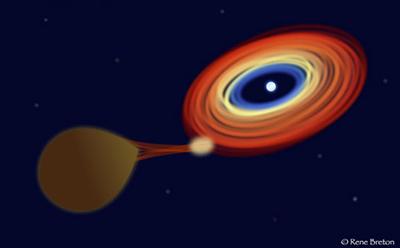 An international team of astronomers made the discovery by observing a very faint binary system, J1433 which is located 730 light-years away. The system consists of a low-mass object – about 60 times the mass of Jupiter – in an extremely tight 78-minute orbit around a white dwarf (the remnant of a star like our Sun).
An international team of astronomers made the discovery by observing a very faint binary system, J1433 which is located 730 light-years away. The system consists of a low-mass object – about 60 times the mass of Jupiter – in an extremely tight 78-minute orbit around a white dwarf (the remnant of a star like our Sun).
Due to their close proximity, the white dwarf strips mass from its low-mass companion. This process has removed about 90 per cent of the mass of the companion, turning it from a star into a brown dwarf.
Most brown dwarfs are ‘failed stars’, objects that were born with too little mass to shine brightly by fusing hydrogen in their cores. By contrast, the brown dwarf in this system was born as a full-fledged star, but has been stripped to its current mass by billions of years of stellar cannibalism.
Read the full story at University of Southhampton News

